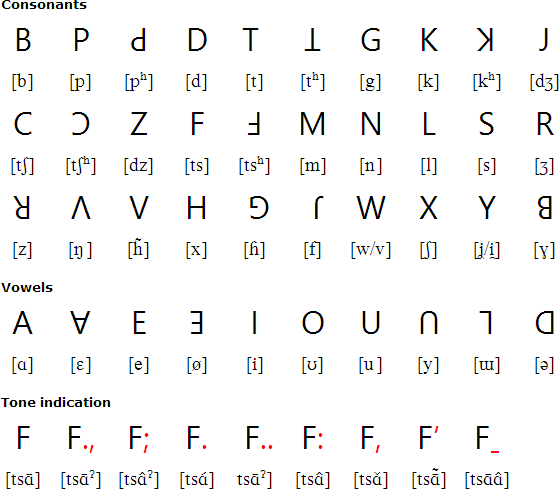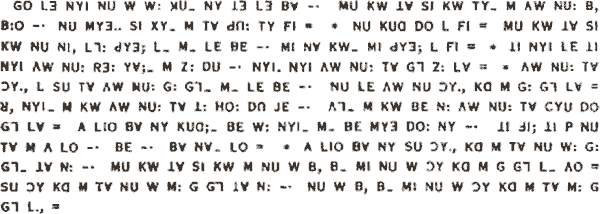The Fraser alphabet, or Old Lisu Alphabet, was invented in about 1915 by Sara Ba Thaw, a Karen preacher from Myanmar. It was improved by the missionary James O. Fraser, a missionary who lived and worked with the Lisu people in China from 1910 to 1949. During his time in China, Fraser learnt to speak Chinese and Lisu and produced a Lisu translation of the New Testament using his alphabet. He also devised a system of muscial notation for the Lisu to use.
In 1992 the Chinese government recognised the Fraser alphabet as the official script for the Lisu language and has encouraged its use since then. Lisu has also been written with Pollard Script, the Lisu syllbary and the Latin Lisu alphabet.

Hear how to pronounce Lisu:

So when you pray, you should pray like this: Our Father in heaven, we pray that your name will always be kept holy. We pray that your kingdom will come, and that the things you want will be done here on earth, the same as in heaven. Give us the food we need for each day. Forgive the sins we have done, the same as we have forgiven the people that did wrong to us. Don't let us be tempted, but save us from the Evil One. Yes, if you forgive other people for the things they do wrong, then your Father in heaven will also forgive you for the things you do wrong.
Source: http://www.language-museum.com/l/lisu.htm
Information about Lisu | Fraser Alphabet | Pollard Script | Numbers | Tower of Babel
Information about the Fraser alphabet
http://en.wikipedia.org/wiki/Fraser_alphabet
https://r12a.github.io/scripts/lisu/lis.html
http://phjamr.github.io/lisu.html
Information about J. O. Fraser
https://en.wikipedia.org/wiki/James_O._Fraser
Ahom, Aima, Arleng, Badagu, Badlit, Basahan, Balinese, Balti-A, Balti-B, Batak, Baybayin, Bengali, Bhaiksuki, Bhujimol, Bilang-bilang, Bima, Blackfoot, Brahmi, Buhid, Burmese, Carrier, Chakma, Cham, Cree, Dehong Dai, Devanagari, Dham Lipi, Dhankari / Sirmauri, Ditema, Dives Akuru, Dogra, Ethiopic, Evēla Akuru, Fox, Fraser, Gond, Goykanadi, Grantha, Gujarati, Gunjala Gondi, Gupta, Gurmukhi, Halbi Lipi, Hanifi, Hanuno'o, Hočąk, Ibalnan, Incung, Inuktitut, Jaunsari Takri, Javanese, Kaithi, Kadamba, Kamarupi, Kannada, Kawi, Kharosthi, Khema, Khe Prih, Khmer, Khojki, Khudabadi, Kirat Rai, Kōchi, Kodava Lipi, Komering, Kulitan, Kurukh Banna, Lampung, Lanna, Lao, Lepcha, Limbu, Lontara/Makasar, Lota Ende, Magar Akkha, Mahajani, Malayalam, Meitei (Modern), Manpuri (Old), Marchen, Meetei Yelhou Mayek, Meroïtic, Masarm Gondi, Modi, Mon, Mongolian Horizontal Square Script, Multani, Nandinagari, Newa, New Tai Lue, Ojibwe, Odia, Ogan, Pahawh Hmong, Pallava, Phags-pa, Purva Licchavi, Qiang / Rma, Ranjana, Rejang (Kaganga), Sasak, Savara, Satera Jontal, Shan, Sharda, Sheek Bakrii Saphaloo, Siddham, Sinhala, Sorang Sompeng, Sourashtra, Soyombo, Sukhothai, Sundanese, Syloti Nagri, Tagbanwa, Tai Noi, Takri, Tamil, Tanchangya (Ka-Pat), Tani, Thaana, Telugu, Thai, Tibetan, Tigalari, Tikamuli, Tocharian, Tolong Siki, Vatteluttu, Warang Citi
Page last modified: 30.10.23
[top]
You can support this site by Buying Me A Coffee, and if you like what you see on this page, you can use the buttons below to share it with people you know.

If you like this site and find it useful, you can support it by making a donation via PayPal or Patreon, or by contributing in other ways. Omniglot is how I make my living.
Note: all links on this site to Amazon.com, Amazon.co.uk
and Amazon.fr
are affiliate links. This means I earn a commission if you click on any of them and buy something. So by clicking on these links you can help to support this site.
[top]